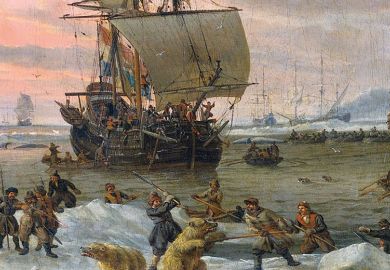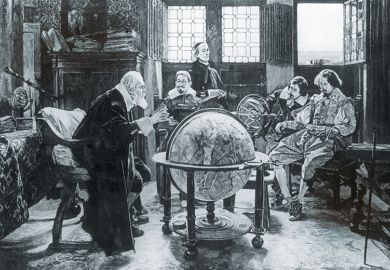The title of this book proclaims its ambitious intent. Its author, Jürgen Renn, director of the Max Planck Institute for the History of Science in Berlin, is generally very successful in providing a thorough and informed analysis of how knowledge about the physical world has been developed, maintained and disseminated in different societies – through what he calls their knowledge economies. His historical reach is impressive: he illustrates such knowledge economies with a wealth of pertinent examples ranging from prehistorical times to the present.
Renn is also keenly aware of geography, as his discussion spans many diverse cultures, each with its own traditional local knowledge economy. A recurrent theme is how different knowledge economies interact, as on the Silk Road that conveyed people, goods and many forms of knowledge in both directions between the East and the West over a period of some two millennia. Yet knowledge transfer is a complex phenomenon and invariably involves the modification of ideas in response to the cultural norms of the recipient society, as we see in the case of Greek scientific and philosophical texts that were first translated by Arabic writers and further reinterpreted in turn when translated into Latin. Renn also discusses the globalisation of modern science and how this ideal has been adopted, modified or rejected in various local contexts.
The book adopts a broad view of knowledge that encompasses not only what we would today describe as scientific knowledge, but also technical competences, such as the ancient Polynesian skill of navigating vast distances using naturally occurring phenomena and the construction techniques preserved in many traditional societies. Moreover, for Renn, knowledge economies include their impact on people’s lives and on the environments that they inhabit. Thus, social structures, economics, politics and even religion are seen as intrinsic to a society’s knowledge economy.
The maintenance and transmission of knowledge also require a range of technologies, such as papermaking and (later) the printing press, along with the social skills of writing and performing mathematical calculations. Institutions play a crucial role in sustaining knowledge economies: for example, the priestly castes found in many traditional societies and the Greek schools of philosophy (which introduced the critical approach so important to modern science). More recent cases include scientific societies, such as the Royal Society of London, and the periodical press, including Times Higher Education.
Renn’s analysis invites comparison with Thomas Kuhn’s now rather outdated but widely known book The Structure of Scientific Revolutions (1962), which likewise offers an overview of the historical development of science. However, Kuhn considered that science possessed its own inner logic and progressed almost independently of its social context, whereas Renn draws on the burgeoning literature on the social relations of science and emphasises its interaction with other forms of knowledge and culture. Another significant difference is that Kuhn saw scientific disciplines as undergoing revolutionary changes, with new paradigms replacing old ones, whereas Renn offers a sophisticated evolutionary account of scientific change. For example, he argues that even significant innovations, such as Newtonian mechanics, underwent slow and rather piecemeal development influenced by local factors. Moreover, old views and techniques are not discarded but often retained over a long period. The analogies with Darwinian biological evolution are evident.
The significance of the book’s subtitle – “rethinking science for the Anthropocene” – becomes apparent in the final chapters. Throughout much of the Holocene epoch, humankind developed a variety of technologies, such as subsistence farming, that had only a limited impact on the environment. Particularly during the past century, however, not only has the world’s population increased significantly but human activity has impacted decisively on the environment and interfered with its ecosystems, leading to the extinction of numerous animal species. The term “Anthropocene” is increasingly used to refer to this current geological age.
While science and technology are clearly implicated in climate change, there is much debate about whether and how they should be employed in addressing environmental problems. Some look to them for a quick fix. Renn’s argument, however, is that we must understand the complex relations between knowledge economies and the human cultures in which they are embedded if we are to tackle these issues in an appropriate way. Thus, the history of science has an important role to play in discussions of how best to address the urgent environmental challenges that we face today. That task is not the work of the scientist alone or the engineer alone, nor both of them working together. Instead, Renn rightly insists, pressing concerns now require the combined expertise of the natural sciences, technology, the social sciences and the humanities.
Knowledge will be vital in helping us address such crucial challenges – and the better the knowledge, the more likely we are to be successful. However, as Renn is well aware, knowledge can be blocked or perverted by vested interests; for example, scientists working for the tobacco industry have disputed the strongly substantiated link between smoking and lung cancer. He also rightly stresses that technologies frequently produce unintended consequences; for example, while antibiotics have become crucial in modern medicine, their excessive use has resulted in strains of bacteria becoming resistant to them.
An example of humankind successfully addressing a potentially serious environmental issue can be seen in the response to the discovery, in 1985, of a substantial hole in the ozone layer over Antarctica. This was traced to the presence of chlorofluorocarbons, widely used in refrigerators and aerosol sprays. An international ban followed. However, our current Western knowledge economy is generally not well suited to addressing the dangers of climate change. For Renn, a major problem is the fragmentation of knowledge into numerous specialisms, whose practitioners generally communicate only with others in their field but fail to liaise with experts in other areas or with a wider audience. What is needed, he argues, is a significant reshaping of the knowledge economy in order to gain a more holistic understanding of the environmental challenges we face. He also recognises that to survive the environmental crisis intact, we must make significant changes to our lifestyle, especially in countries with high-impact consumption.
Insufficient attention is paid in the book, however, to the often obstructive influence of politics on today’s knowledge economy. For example, Donald Trump has eviscerated the Environmental Protection Agency, thus restricting its ability to disseminate evidence of environmental change. Likewise, Boris Johnson’s recent Cabinet reshuffle moved responsibility for science to the Department for Business, Energy and Industrial Strategy. This weakens the important link between science and education and further reinforces the perception that science is principally the handmaiden of industry and thus of the economy. It also further reduces the possibility of implementing the holistic approaches that Renn sees as necessary for addressing environmental issues.
Given the importance that he attributes to effective communication, it is unfortunate that his book is not an easy read. In particular, Renn uses many technical terms, which makes parts of his argument difficult to appreciate (even with the glossary provided). Yet this is an important book and one that powerfully advances our understanding of how knowledge operates in society while directly engaging with pressing contemporary issues.
Geoffrey Cantor is professor emeritus of the history of science at the University of Leeds.
The Evolution of Knowledge: Rethinking Science for the Anthropocene
By Jürgen Renn
Princeton University Press, 584pp, £30.00
ISBN 9780691171982
Published 11 February 2020
The author
Jürgen Renn, director of the Max Planck Institute for the History of Science in Berlin since its foundation in 1994, is also an honorary professor for the history of science at both Humboldt University of Berlin and the Free University of Berlin.
Born in Moers, Germany, he studied physics at the Free University and later obtained a doctorate in mathematics at the Technical University of Berlin. From 1986 to 1992, he was based at Boston University as co-editor of the collected papers of Albert Einstein. He has retained his links with Boston and also held visiting positions at institutions including Tel Aviv University, ETH Zurich and the California Institute of Technology.
As a leading expert on Einstein, Renn has published books including The Formative Years of Relativity: The History and Meaning of Einstein's Princeton Lectures (2017) and Einstein on Einstein: Autobiographical and Scientific Reflections (2020), both written with Hanoch Gutfreund. As well as Albert Einstein: Chief Engineer of the Universe (2005), Renn was responsible for Archimedes: The Art and Science of Invention (2013) and other exhibitions devoted to the history of science.
According to its website, Renn’s research group focuses on “develop[ing] a theoretical understanding of knowledge evolution”. This has meant ranging widely across history, from “the origin of theoretical science in antiquity” through “the emergence of classical mechanics in the early modern period” and all the way to “the revolutions of modern physics in the early twentieth century”. Yet this “longitudinal perspective” has been accompanied by “a transversal approach” looking at more general issues of “dissemination and transformation processes of knowledge across cultural boundaries” along with “processes of globalization” and the origins of the Anthropocene.
An early proponent of the digital humanities and of open access, Renn was a key figure behind the crucial Berlin Declaration on Open Access to Knowledge in the Sciences and Humanities, launched in 2003, and also helped to create the Edition Open Access publications platform.
Matthew Reisz
POSTSCRIPT:
Print headline: Our collective understanding
Register to continue
Why register?
- Registration is free and only takes a moment
- Once registered, you can read 3 articles a month
- Sign up for our newsletter
Subscribe
Or subscribe for unlimited access to:
- Unlimited access to news, views, insights & reviews
- Digital editions
- Digital access to THE’s university and college rankings analysis
Already registered or a current subscriber?







